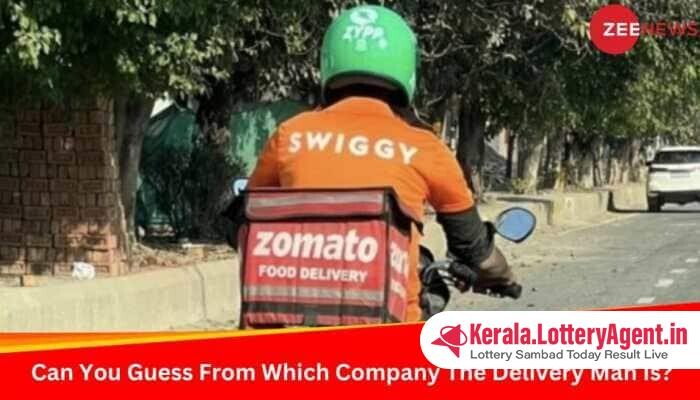
In New Delhi, amid the hasty online orders and late-night food cravings, a curious sight has emerged that demonstrates the often invisible, yet indispensable, role of delivery agents in our digitized world. These delivery agents, often referred to as the unsung heroes of modern urban convenience, have recently been the center of netizen’s attention due to an intriguing incident involving a mix of brand uniforms.
The incident involved a delivery agent from Zomato, one of India’s leading food delivery services, who was spotted donning a rather eclectic assortment of apparel and accessories. The viral image that captured this moment showed the agent astride his motorcycle outfitted with a red delivery bag from Zomato. However, what piqued the interest of social media users was not just the Zomato bag, but also the bright orange T-shirt with the contrasting Swiggy logo – Zomato’s primary competitor – worn by the rider. To top off the ensemble, the delivery person sported a green helmet bearing the insignia of Zypp, a company known for providing electric vehicle rentals.
The photo that immortalized this blend of corporate identities did not take long to spread across social media platforms, eliciting reactions filled with humor, bewilderment, and contemplation from the online community. The amalgamation of different service provider logos on a single delivery agent set a whirlwind of questions and jokes into motion.
A notable share on the social platform X, which now occupies the space previously known as Twitter, reflected the general bewilderment: “Who are you? Swiggy? Zomato? Zypp? We live in a digital mess.” This sentiment echoed the confusion experienced by many witnesses of the digital jumble.
Netizens’ reactions to the viral phenomenon ranged from witty one-liners to suggestions for new business models. Some users identified the agent as a versatile delivery transport service provider, jokingly suggesting an expansion of his client base beyond just Swiggy and Zomato. Others played on popular culture references, comparing the situation to the famous Bollywood movie “Amar, Akbar, Anthony,” which is about three brothers, each raised in different religious households, unaware of each other’s existence.
A few commentators on the quirk of the situation even highlighted potential regulatory issues, pointing out the absence of a license plate on the delivery agent’s bike. On a more serious note, some suggested that the emergence of such scenarios indicates a need for an aggregator platform to unify the various on-demand services.
While amusement was the predominant response, there were also implicit questions about the working conditions of delivery personnel. The practice of ‘moonlighting’ – taking on additional jobs or gigs outside of one’s main employment – was mentioned by one user, perhaps suggesting the economic necessity that drives individuals to work for multiple competing platforms at once.
This occurrence has opened a dialogue about the lives of those who serve as the lifeblood of the delivery industry, often operating unseen and multi-tasking between various jobs to make ends meet. Moreover, it has sparked conversations about consumer behaviors, company affiliations, and the evolving nature of work in the gig economy.
As the delivery agent’s photo continues to provoke thought and laughter, it stands as a testament to the complex mosaic of the gig economy and the unique ways in which individuals navigate this environment. It also reminds us of the fundamental human ability to adapt, improvise, and merge identities in order to face the demands of an ever-changing digital landscape.












